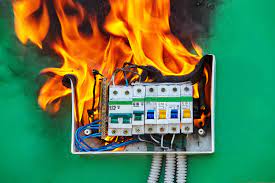 Grounding is vital to any electrical system as it protects the user and equipment from electrical faults. In essence, grounding prevents an electrical fault by providing a path for excess electricity to flow harmlessly away from the user or equipment before it can cause damage. An electrical fault can quickly become dangerous without grounding, potentially leading to fires and shocking hazards.
Grounding is vital to any electrical system as it protects the user and equipment from electrical faults. In essence, grounding prevents an electrical fault by providing a path for excess electricity to flow harmlessly away from the user or equipment before it can cause damage. An electrical fault can quickly become dangerous without grounding, potentially leading to fires and shocking hazards.
When an electrical fault occurs, usually due to a loose connection or broken wire in an electrical circuit, there is an imbalance between the "hot" side of the circuit and its return line to the ground. This difference in potential creates a high voltage differential between the two points, resulting in a surge of electric current that can cause physical harm. By providing a safe path of low resistance (ground) for this electric surge to travel through, grounding allows this energy to safely dissipate into the earth instead of causing injury.
Grounding also serves as a safety measure by preventing electrical shock if you accidentally come into contact with exposed metal parts on wiring systems when power is turned on. When properly grounded, these metal parts are connected directly to the ground and, therefore, cannot store static electricity, which can cause shocks if touched. Properly installed ground wires will quickly disperse any stored static electricity into the earth where workers around heavy equipment cannot feel it.
What Is Earthing?
Earthing and bonding, two critical concepts in electrical wiring, usually need clarification or clarification. While both are related to connecting a power system and ground, they have different applications and therefore require other methods for achieving safety.
Earthing connects an exposed metal part to the earth's ground with a conductive material such as copper or aluminum wire to provide protection from voltage surges and protect people from electric shocks. Earthing helps divert any excess electricity that builds up back into the ground instead of through your body, which can be dangerous or even fatal. It also helps stabilize the current flow when there is an interruption in the supply line.
What Is Bonding?
Bonding, on the other hand, is the process of connecting different parts of an electrical system with a conductor to ensure they are at the same potential. Bonding eliminates differences in electrical potential between multiple circuits, reduces shock hazards caused by current leakage across surfaces, and ensures better operation of integrated systems. Bonding involves joining non-current carrying parts together but not directly to the earth's ground as it does not provide any protective benefits against electric shocks or flows of electricity but instead increases reliability inside equipment elements among exposed conductive parts that could come into contact with humans under normal operating conditions.
In conclusion, grounding is essential in preventing electrical faults from becoming dangerous by providing a safe pathway for electric currents to travel without risking human life or property damage. Keep yourself protected adequately with grounded equipment today
Get In Touch With Us Today
Our Ground fault circuit interrupter (GFCI) devices are engineered to offer reliable protection against ground faults, keeping your workers and equipment safe from electrical hazards. Don't wait until an accident happens before taking action - Swartz Engineering's GFCI products offer peace of mind, improved worker safety, and safeguarded valuable equipment. Get in touch today to find out more!.
Products We Offer
Swartz Engineering strives to provide top-quality products to achieve our customers needs. Our products include:
- Type 76 DC Relay
- Type 82 DC Relay
- Swartz Engineering’s Type 64 Ground Relay
- Type 32 Reverse Current Relay
- Type 150 DC
- CSM Shield Monitor
- Metal Oxide Surge Arrestors
- Transducers
- MVIS SL Slim-line Contactor
- Fully-tested Power Control Rooms
- Swartz Engineering’s Portable Substations
